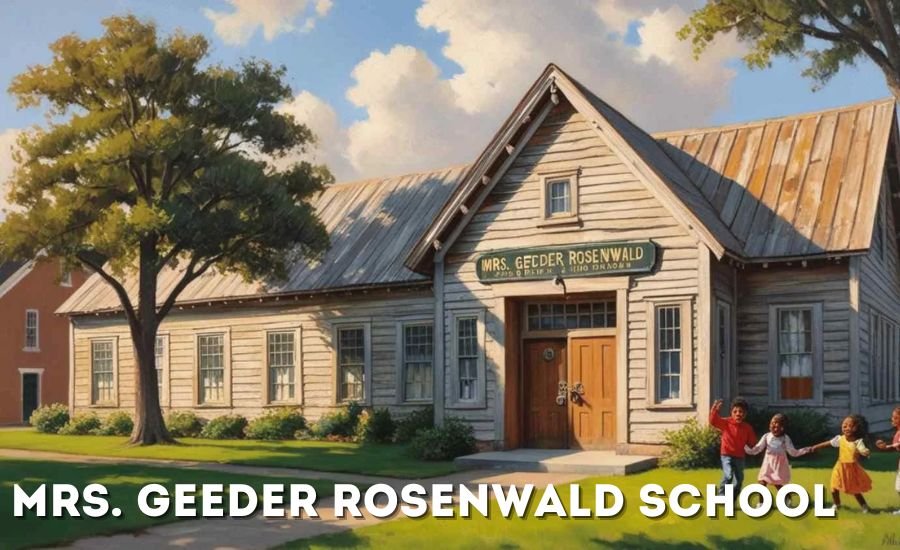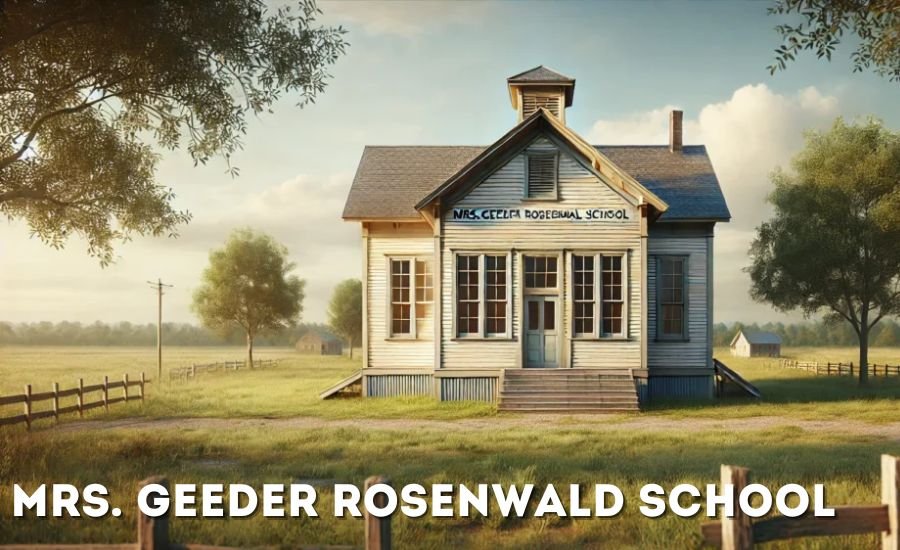The Enduring Legacy of Mrs. Geeder Rosenwald School Movement

The early 20th century in America was a time of significant educational disparity, especially in the Southern United States. For African American children, access to quality education was almost nonexistent due to systemic racism and segregation. In this landscape of inequality, the Rosenwald Schools initiative emerged as a beacon of hope. Among the many champions of this movement, Mrs. Geeder played an instrumental role in supporting her local Rosenwald School, contributing significantly to the education of African American children. This article dives deep into the history and impact of the Mrs. Geeder Rosenwald School and how its legacy continues to inspire.
The Genesis of the Rosenwald School Movement
The Rosenwald School movement began in the early 1900s, born from a partnership between Julius Rosenwald, a philanthropist and president of Sears, Roebuck & Co., and Booker T. Washington, an influential African American educator. Washington, who founded the Tuskegee Institute, recognized that quality education was the key to economic and social mobility for African Americans. He envisioned schools that would provide not only academic learning but also practical skills that could help students thrive in a segregated society.
Rosenwald, inspired by Washington’s vision, funded the creation of schools in rural African American communities. The Rosenwald Fund, established in 1917, aimed to address the severe lack of educational resources available to Black children in the South. Over the next two decades, more than 5,000 schools were built across 15 states. Among these was the Mrs. Geeder Rosenwald School, which became a cornerstone of education and empowerment in its community.
Geeder’s Role in the Educational Upliftment
While Julius Rosenwald’s funding made these schools possible, local community members were the ones who truly brought them to life. Mrs. Geeder was one such figure who worked tirelessly to ensure that her local Rosenwald School was established, sustained, and flourished.
Though little is known about her early life, Mrs. Geeder’s passion for education and her community is well-documented. She saw education as a means to lift her community out of poverty and give children the opportunity for a better future. Mrs. Geeder rallied local families, organized fundraisers, and secured land to construct the school. Her dedication to ensuring the school’s success made her a beloved figure in the community and a powerful advocate for educational reform.
The Design and Functionality of Rosenwald Schools
The architectural design of the Rosenwald Schools was both innovative and practical. Julius Rosenwald and his team developed standardized building plans emphasising natural light, ventilation, and ample classroom space. This was particularly important in rural areas where many African American children were forced to learn in dilapidated, overcrowded, and poorly lit conditions.
The Mrs. Geeder Rosenwald School, like many others, was a modest one-room or two-room structure. However, it was meticulously designed to foster a conducive learning environment. Large windows let natural light flood the classrooms, creating a bright and welcoming space for students. The building was designed to be affordable and accessible to construct, with the community providing labour and materials wherever possible.
These schools were not just places of learning; they became community centres where families gathered for meetings, celebrations, and meaningful discussions about the future of their children’s education.
Educational Opportunities at Mrs. Geeder Rosenwald School
The curriculum at Mrs. Geeder Rosenwald School was comprehensive and designed to equip students with both academic knowledge and practical skills. Students learned core subjects such as reading, writing, arithmetic, history, and geography. However, what set the Rosenwald Schools apart was their focus on vocational training.
In addition to academic subjects, Mrs. Geeder’s school students were taught practical skills such as agriculture, carpentry, and homemaking. These skills were invaluable for African American children living in rural areas, as they prepared students for work in a segregated economy while also empowering them to pursue higher education and break free from the cycle of poverty.
Mrs. Geeder was known for her holistic approach to education. She believed that schooling was not just about imparting knowledge but about shaping well-rounded individuals who could contribute positively to society. Her dedication to the students’ personal growth and success inspired many to become leaders in their own right.
Overcoming Challenges in Segregated America
The Mrs. Geeder Rosenwald School faced numerous challenges throughout its existence. Segregation laws in the South severely limited the resources available to African American schools. Funding was minimal, and supplies were often outdated or in poor condition. Textbooks were scarce, and many schools had to make do with whatever materials they could gather.
However, Mrs. Geeder’s unwavering commitment to the school helped it thrive despite these obstacles. She worked closely with parents, local businesses, and philanthropists to secure additional funding and resources. The community supported the school, often contributing labour, materials, and money to ensure its continued operation.
Beyond the issue of resources, African American children also faced daily discrimination and segregation. They were denied access to the same opportunities as their white counterparts, and the schools they attended were often seen as inferior. However, Mrs. Geeder and her fellow educators instilled a sense of pride and resilience in their students, encouraging them to pursue their dreams despite the barriers they faced.
The Closure and Legacy of Rosenwald Schools

The Civil Rights Movement of the 1950s and 1960s eventually led to the desegregation of public schools across the United States. While this was a significant victory for African Americans, it also led to the decline and closure of many Rosenwald Schools, including the Mrs. Geeder Rosenwald School. As African American students were integrated into previously segregated white schools, the need for Rosenwald Schools diminished.
Despite its closure, the legacy of the Mrs Geeder Rosenwald School lives on. Many of the school’s former students became educators, activists, business leaders, and professionals who played critical roles in their communities. The school’s emphasis on academic achievement and practical skills helped shape generations of African American leaders.
Modern-Day Recognition and Preservation
There has been a renewed interest in preserving the history of Rosenwald Schools in recent years. Efforts are underway to restore many of these buildings and recognize their historical significance. The Mrs. Geeder Rosenwald School has been designated a historical landmark, and preservation projects aim to ensure its legacy continues to inspire future generations.
Restoration efforts include repairing the school’s original structure, creating educational exhibits, and hosting heritage tours that highlight the school’s impact on the local community. These initiatives are essential for preserving history and educating the public about the ongoing fight for educational equity.
You May Also Like: www-goodmooddotcom-com-cruising-category
The Lasting Impact of Mrs Geeder Rosenwald School on Modern Education
The story of the Mrs. Geeder Rosenwald School is a powerful reminder of the importance of community-driven education. In a time when African Americans were denied fundamental rights and opportunities, individuals like Mrs. Geeder stepped up to ensure that children in their communities had access to quality education.
Today, the legacy of Rosenwald Schools, particularly the Mrs. Geeder Rosenwald School, continues to influence discussions about educational reform. The school stands as a testament to the power of education to uplift marginalized communities and create pathways to success. Its legacy encourages us to continue striving for a future where all children, regardless of race or background, have access to the education they deserve.
Conclusion
The Mrs. Geeder Rosenwald School is much more than a historical building; it symbolises perseverance, community, and the transformative power of education. Through her dedication and passion, Mrs. Geeder left an indelible mark on her community and on the lives of countless students. Her work reminds us that education is not just about imparting knowledge but about empowering individuals and communities to create a brighter future.
As we continue to preserve and celebrate the legacy of the Mrs Geeder Rosenwald School, we are reminded of the importance of educational equity and the vital role that community-driven initiatives play in creating lasting change.
FAQs
Q: What was the purpose of the Mrs. Geeder Rosenwald School?
A: The Mrs. Geeder Rosenwald School was built to provide quality education to African American children in the rural South during segregation, offering academic and vocational training.
Q: Who funded the Mrs. Geeder Rosenwald School?
A: The school was funded by the Rosenwald Fund, a philanthropic initiative by Julius Rosenwald in partnership with Booker T. Washington, with additional support from local communities.
Q: What made Mrs. Geeder’s role necessary in the school?
A: Mrs. Geeder was instrumental in rallying her community to support the school, securing resources, and ensuring students received a quality education.
Q: Why did the Mrs. Geeder Rosenwald School close?
A: The school closed after the desegregation of public schools in the 1950s and 1960s when African American students were integrated into previously segregated white schools.
Q: What was unique about the design of Rosenwald Schools?
A: Rosenwald Schools were designed to maximize natural light and ventilation, creating a conducive learning environment despite limited resources.
Q: How did the Mrs. Geeder Rosenwald School impact the community?
A: The school served as a centre for education, community gatherings, and empowerment, helping generations of students succeed academically and professionally.
Q: Have there been any efforts to preserve the Mrs. Geeder Rosenwald School today?
A: Reservation efforts are underway to restore the school and maintain it as a historical landmark, honouring its significance in educational history.
Get the Latest Updates On ILOUNGE

Specializing in insightful and engaging articles across a range of topics. With a keen eye for detail and a passion for delivering high-quality information, Mary helps readers stay informed with the latest trends and updates


